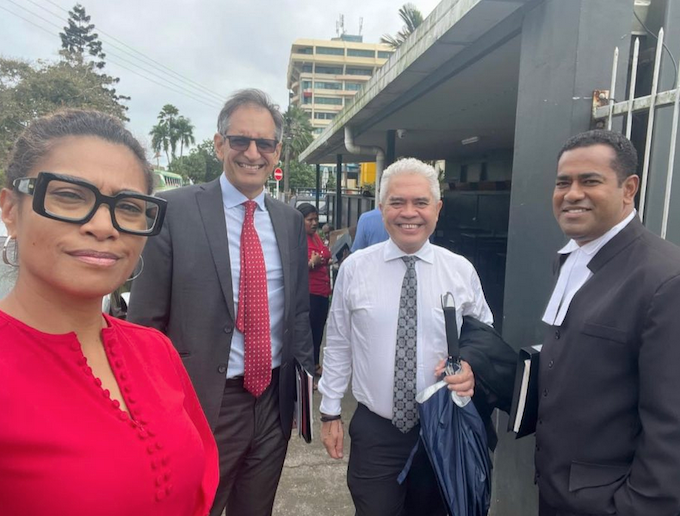
Pacific Media Watch newsdesk
Amnesty International and Civicus have called on the Fiji government to drop contempt of court charges against a lawyer in Fiji for exercising his right to freedom of expression.
On 27 June 2022, Fiji’s Attorney-General Aiyaz Sayed-Khaiyum filed charges for contempt of court against senior lawyer and former journalist Richard Naidu for highlighting on social media an error in a court judgment where the word “injection” was used instead of “injunction’.
Amnesty International and Civicus said in a statement the charges were an “excessive and politically motivated response” to pointing out a spelling error in a court judgment and they violated the right to freedom of expression.
- READ MORE: Other reports on Fiji contempt lawsuits
- Richard Naidu political lawsuit
- Fiji freedom of speech
The Attorney-General acknowledged that the error pointed out by Richard Naidu was indeed a spelling mistake. He went on to claim that Richard Naidu’s post was malicious and invited others to mock the judiciary, referencing the comments and responses from others on social media.
Amnesty International and Civicus said they opposed the use of contempt of court or similar accusations used by the authorities deemed to amount to “scandalising the court” because this notion was inherently vague, and incompatible with the right to freedom of expression.
They were also not necessary for legitimate public interests (including the orderly proceedings of a court or the judicial process).
This type of contempt of court accusation was also subject to misuse, with penalties including large fines and imprisonment, the statement said.
Freedom of expression protected
“Under international human rights law and standards, the right to freedom of expression is protected. This right includes being allowed to make comments that may be regarded as critical, or even deeply offensive of government institutions, including the judiciary,” the statement said.
“Any restrictions on this right, including the threat of prosecution and punishment for ‘contempt of court’, must therefore be clearly provided for by law, and demonstrably necessary and proportionate for the purpose of protecting specified and legitimate public interests or the rights or reputations of others.
“In its General Comment on Article 19 of the International Covenant on Civil and Political Rights, which provides for freedom of expression, the Human Rights Committee, the UN body charged with overseeing the implementation of the Covenant by its member states, explains that:
“Contempt of court proceedings relating to forms of expression may be tested against the public order (ordre public) ground. In order to comply with paragraph 3, [providing for restrictions on this right] such proceedings and the penalty imposed must be shown to be warranted in the exercise of a court’s power to maintain orderly proceedings. Such proceedings should not in any way be used to restrict the legitimate exercise of defence rights.”
“The maintenance of orderly proceedings” included the protection of the rights of the accused and responding to acts which amount to obstruction of, and interference with, the judicial process, the joint statement said.
“Such powers must not be exercised in a manner that restricts the right to freedom of expression beyond those restrictions provided for in international human rights law.
‘Manifestly disproportionate’
“Pursuing a lawyer with legal punishment for pointing out accurately a spelling mistake in a public court judgment on social media is manifestly disproportionate and a violation of his right to exercise his freedom of expression. It could also be seen as an act of intimidation or harassment.”
Fiji’s civic space rating remained “obstructed”, according to the Civicus Monitor, a research tool the NGO uses to track the state of civil society and civic freedoms in 196 countries.
This was the most recent in a string of cases where legal proceedings have been abused to silence journalists, non-governmental organisations, political opponents, and lawyers.
Naidu faces hefty fines and possible imprisonment should he be convicted of the offences.
Other laws used to stifle freedoms include sedition provisions in the Crimes Act as well as the Public Order (Amendment) Act 2014 that have been used to target journalists, activists and government critics, while other sections of the Public Order Act have been used to arbitrarily restrict peaceful protests.
The Fijian government has resisted calls to allow the UN Special Rapporteur on the Independence of Judges and Lawyers to visit and assess the situation since 2009 when major judicial reforms were implemented.
“The recent contempt charge undermines the independence of lawyers and the legal profession and will have a chilling effect on freedom of expression,” said the statement.
“This is contrary to the government’s duty to ensure that lawyers are able to perform their professional duties, which include scrutiny of courts, safely and without any threat, intimidation or harassment.
Amnesty International and Civicus call on the Fiji authorities to:
- Immediately drop contempt of court charges issued on 27 June 2022 against Richard Naidu;
- Refrain from prosecutions of lawyers, journalists and non-governmental organizations solely for the peaceful expression of opinions online or in any other medium;
- Publicly commit to upholding the right to freedom of expression, which includes the right to be critical, consistent with international human rights laws and standards and Fiji’s Constitution; and
- Invite the UN Special Rapporteur on the Independence of Judges and Lawyers to visit Fiji and fully co-operate with their visit.












































